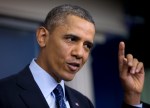There’s a reason Fox News claims to be “Fair and Balanced”: Americans want our media to be 100 percent objective. Give us the straight story, we say, and let us form our own conclusions.
Videos by Rare
Just the facts, ma’am, just the facts.
Completely unbiased news sounds like a nice idea, but in real life it’s 100 percent impossible.
And you know what? That’s actually a really good thing.
Here’s why: Reporters are people, and people naturally have opinions. Journalists whose job it is to discover, read, and share news are especially likely to have opinions—in part because they get paid to do it, and in part because the sheer volume of news to which they’re exposed will eventually trigger some reactions.
So more than the average citizen, members of the media are likely to have strong views about the stories they’re reporting. And it’s pretty inevitable that some of that perspective is going to leak into their reports, no matter how much a journalist is trying to be objective. Whether in subtleties of word choice, or sources interviewed, or photo selection, it isn’t possible for a human reporter to function as a pure conveyor of information. They are, after all, people—not video cameras!
Even the plainest, most robotic report of the facts has some level of bias simply because it’s this story, rather than another, which is given the reporter’s limited attention. How can we expect unbiased journalism when just deciding which news is worth covering is inherently biased?
Now, none of this means that reporters are trying to trick us into believing that their opinions are fact. Sure, some of them are intentionally deceptive, but most of the time it’s just that despite any journalists’ best efforts to be objective, their own views will shape their reporting.
It also shouldn’t be surprising that journalists often work with people who share their opinions—or that we have news organizations with obvious political agendas, which are constantly claiming those agendas don’t exist. We all know how this works: Fox is the Republican National Committee; MSNBC is an extension of the Obama Press Office; CNN is really into planes—you get the idea.
Faced with these noticeable ideological alignments, it’s fairly common to bemoan how biased and broken our news is. Distrust of the media has hit record highs for precisely this reason, and there are whole organizations dedicated to calling out examples of bias in their political opponents.
But I’d say this clear bias is actually a good thing. In fact, if it wasn’t so blatant, we’d be in big trouble.
There are two big reasons for this. First, as I’ve mentioned, it’s a fact of life that journalists have their own viewpoints, and I’d like to have a decent idea of when those are going into a news story. It’s better to have a reporter admit, “This is where I stand,” than to read an inevitably biased article while assuming you’re getting the gospel truth.
Opinion can’t hide as news if the audience is keeping a sharp lookout for that very thing, so give me obvious bias over false objectivity any day.
Second, sometimes good reporting needs to include opinion. As American journalist Walter Lippmann famously said, “There can be no higher law in journalism than to tell the truth and to shame the devil.” Telling the truth will sometimes require saying more than “just the facts,” and in an age when we need a watchdog media more than ever, reporters should have the freedom to shame the devil.
Think about it: Was recent Pulitzer Prize winner Glenn Greenwald biased in his reports about NSA whistleblower Edward Snowden? Absolutely. He was biased against governments spying on innocent people.
And it was exactly what we needed.
Bias is inevitable, but it’s all too easy for members of the media to let their personal opinion be overridden by a bias toward the political establishment. It’s a lot less work to follow the same old beat, talk to the same old sources, and print the same old lines from the same old bureaucrats than it is to find and verify new voices challenging government authority. (Ron Paul supporters in particular probably know what I’m talking about.)
As Greenwald himself put it, “this mentality condemns—and would render outlawed—most of the worthwhile investigative journalism over the last several decades.” In other words, it makes journalists more lapdogs of government than watchdogs for the people.
And that’s why I say screw “unbiased” news: There’s no such thing, and anyone who tells you otherwise is trying to sell you something—probably their own bias, carefully wrapped in a big, pro-government blanket of false objectivity.










